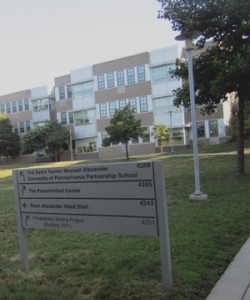The Penn Alexander School (4209 Spruce St.) today was named a National Blue Ribbon School, an award the U.S. Department of Education gives to about 350 schools around the country each year deemed “high performing” or “achievement gap closing.” Both public and private schools are eligible.
 Penn Alexander was recognized as an “exemplary achievement gap closing school,” an award that recognizes schools that have consistently improved academic achievement against other schools around the state.
Penn Alexander was recognized as an “exemplary achievement gap closing school,” an award that recognizes schools that have consistently improved academic achievement against other schools around the state.
School officials received the award during a ceremony in the school this afternoon.
In its application, Penn Alexander officials wrote that, “Penn Alexander faculty spends a great deal of time developing programming and extracurricular activities to engage and support our diverse community. We believe the growth and achievement outside of the classroom has a direct impact on bridging the gap of student achievement inside the classroom.”
Two other schools in Philadelphia were also awarded the National Blue Ribbon. St. Mary Interparochial School at 5th and Locusts Streets was named an “exemplary high performing school,” as was the Folk Arts-Culture Charter School at 1023 Callowhill St.








September 28th, 2016 at 4:02 pm
This model needs to replicated throughout the city. All Philadelphia children are entitled to a ‘Blue Ribbon’ education. Not just those whose parents can afford to live in an elite school catchment.
September 28th, 2016 at 4:34 pm
Strongforu … I agree! But UofP isn’t going to help other schools. They’re not going to help the neighborhood. They want a gentrified “utopia”. Penn Alexander is no longer ” those whose parents can afford to live in an elite school catchment”, it’s those whose parents are lucky enough to get the right number since the school’s gone to a lottery-based admission method. So people can buy (overpriced and the freaking property taxes now!!) or rent (very overpriced) to be in the catchment. Does not mean their children will get into the school.
September 28th, 2016 at 4:38 pm
Which aspect of creating a new school with public money on land owned by a private institution and receiving a quarter of a million dollars in annual supplemental funding by said institution do you think is replicable? In a decade and a half since PAS opened, the only similar school created in the entire country is the Henderson-Hopkins School in Baltimore with very different enrollment policies, partnerships, and demographics from the outset.
September 28th, 2016 at 5:18 pm
I’m very keen on this article. It shows me that Philadelphia is not only concerned about creating a better city and learning from the past mistakes, but making our schools great again. Very nice to hear. This award is prestigious. I read about it on Wikipedia and it’s not like other school awards where everyone gets one every few years.
September 29th, 2016 at 2:40 am
I knew that some WPL commenters would be foaming at the mouth when they read this (good) news. It is not Penn’s responsibility to ensure that every child in Philly gets a good education- it is the responsibility of the city. If you don’t like the fact that many public schools are underfunded, then instead of criticizing this success story, work for change. Hating on PAS and Penn helps no one. Also, what is so upsetting about the fact that humans are out for their own self-interest? If you make a great public school with a catchment, people are going to move there. It is no different than a mama bird getting the best worms for her baby birds. It is human nature, it is animal nature (!) and to lament it is pointless. When it comes to any city, change is a constant. Neighborhoods are never not changing. And lastly do not forget that PAS is not only serving the children of well-to-do families! It is a mix!
September 29th, 2016 at 7:52 am
Why does Penn still give the school so much money? Now it could be self-sustaining because the goal has been achieved: they successfully gentrified the area around the campus and have created a local school environment with loads of well-off, highly educated, and highly invested parents. The parents should now be able to carry the school and allow the money to be invested in other community projects.
September 29th, 2016 at 8:46 am
Penn is a multi billion dollar tax exempt business. One way or another, they’ve got to pay their share.
September 29th, 2016 at 8:56 am
Thank you Jessica. Well said.
So many people complaining about PAS…let me ask you, what exactly are you doing to improve other West Philly schools? Do you volunteer? Purchase school supplies? Clean the play ground up? I’m guessing the answer generally is “no” because it’s much easier to gripe on the internet that life isn’t fair than to actually enact change.
What many of the complainers refuse to acknowledge is that PAS’s success is having a ripple effect on Leah Elementary. PAS is the catalyst behind a stable community that emphasizes education. Not everyone can currently afford to purchase a home in the PAS catchment (although I currently have tenants who own elsewhere in the city but who have decided to rent so their children can attend PAS), but if you care enough about your child’s education, get involved and help create a new environment that emphasizes educational opportunities. And guess what? The increasing values in real estate in the area mean increased tax revenues that benefit all school children in Philadelphia.
Penn has no plans to create another PAS. Just accept that and do what you can to make your own child’s school better. I’m very impressed with the parental participation at Leah for example. These are parents who are taking matters into their own hands. As they should.
Oh, and for the record, not a single child who entered the lottery has ultimately been denied placement at PAS. The day may come when that does indeed happen, but historically, that is not the case.
September 29th, 2016 at 12:53 pm
To goldenmonkey: your argument isn’t logical. Penn has and continues to invest in a school that now has sufficient parental investment to no longer need money. If this is what it takes to make a public school sustainable (hundreds of thousands of extra dollars PER YEAR), then that’s a failure and runs counter to your argument. It’s far more realistic (and idealistic) to hope that an initial investment could transform the school into a source of pride and the community into one that cares enough about the school to no longer need continued financial support. Penn Alexander should be able to stand on its own and it’s disheartening to those of us who do work hard to support our local schools that the battle is so uphill for us and the awards come so easily for them…because their dollars and support are not hard fought and won.
For the record, our family has been supporting our neighborhood schools (in 2 neighborhoods) since our son was a newborn. One of us works and has worked full-time for a decade to improve the education system and schools in Philadelphia. So please don’t make personal claims that are insulting and untrue.
September 29th, 2016 at 4:41 pm
no child has been denied in the lottery because there are parents who “care enough about their child’s education” and are unwilling to gamble on their child’s education and chose other options (move out, send to private/parochial, homeschool, etc). the lottery will eventually impact the neighborhood. people with more than one child aren’t going to want having one child at one school and one at another because of a lottery. it’s a logistical headache to get two kids to and from two different schools if the start/end times are the same.
September 29th, 2016 at 5:11 pm
John, how many examples of what you cited are you personally aware of? I’m simply curious and do not doubt you.
neighbor, first of all, I apologize that you thought I was making a personal attack on you. I did write that my comments were not directed at everyone in the thread and that I was impressed by those parents willing to make their schools work for their children.
Unfortunately, I simply do not agree with your reasoning about PAS being a failure. It seems to me that your ire should be directed at the Philadelphia School District and not Penn. Keep in mind that the Penn’s Graduate School of Education is strongly linked to PAS meaning that it’s a long-term “experiment” (probably a poor choice of words there).
September 30th, 2016 at 2:19 am
I don’t think you can give parental involvement that much credit for PAS’s success. Parental involvement fell off a cliff last year when the new background check requirements when into effect, and yet the school still won its blue ribbon.
I’m also suspicious about crediting Penn’s money. It’s a large dollar figure, but the total budget is a much bigger figure. A quick google suggests that the city gives PAS and every other school $12,700 per student, and then PAS gets an extra $1,330 from Penn. An extra 10% is nothing to sneeze at, but when I hear people call PAS “lavishly funded” and other schools “underfunded” I really wonder: are “lavish” and “under” really only 10% apart?
September 30th, 2016 at 10:47 am
Some numbers for context
2010-2011 School Budget Allotment Detail
FY11 School Budgets April 22,2010
Penn Alexander School (1280)
Penn Assisted Total
550,800
2011-2012 School Budget Allotment Detail
FY12 School Budgets May 27, 2011
Penn Alexander School (1280)
Penn Assisted Total
592,000
2012-2013 School Budget Allotment Detail
FY13 School Budgets May 24, 2012
Penn Alexander School (1280)
Penn Assisted Total
697,200
2013-2014 School Budget Allotment Detail
Penn Alexander School (1280)
FY14 School Budgets November 7, 2013
Penn Assisted Total
681,442
2014-2015 School Budget Allotment Detail
Penn Alexander School (1280)
FY15 School Budgets May 14, 2014
Penn Assisted Total
838,924
2015-2016 School Budget Allotment Detail
Penn Alexander School (1280)
FY16 School Budgets (April, 2015)
Penn Assisted Total
847,609
2016-2017 School Budget Allotment Detail
Penn Alexander School (1280)
FY17 School Budgets (June 2016)
Penn Assisted Total
1,282,477
September 30th, 2016 at 10:48 am
Test are comments being moderated?
September 30th, 2016 at 10:53 am
I was trying to provide this information in a more detailed manner but it seems to be setting off the spam blocker. In 2010 the Penn Assisted line item in the PAS budget was $550,800. It has increased over years with last year running at $847,609 and this year it increased to $1,282,477.
September 30th, 2016 at 10:57 am
I having trouble getting a more detailed comment through but the Penn Assisted line item in the PAS budget this year is $1.3 million up from $550,00 in 2010.
September 30th, 2016 at 1:24 pm
Having difficulty phrasing these numbers in a way that will go through. In 2010, the Penn assisted line in the PAS school budget was a over a half a million and it has continued to grow this year reaching a record of over one point three million.
September 30th, 2016 at 1:26 pm
Five years ago the Penn contribution was over .5m and it has only grown this year reaching a record high of 1.3m
September 30th, 2016 at 2:15 pm
Well, is that a good or bad thing?
September 30th, 2016 at 4:15 pm
Are comments being moderated? That one comment of mine popped right up, but anything I try to post now just disappears.
September 30th, 2016 at 4:15 pm
One more try:
Now that I think about it, the Penn money must be going into smaller class sizes. Classes are capped at 24, and the upper grades have even fewer students than that.
There was a lot of support from parents for increasing class size back when the lottery was introduced, but neither Penn nor the school district was willing. Apparently they had tried larger classes in the past (IIRC back when the current 7th grade class was in first grade) and were not happy with how it went.
October 11th, 2016 at 1:19 am
Imagine what every other district school could do with a class-size cap. Hmmmm . . . Maybe it’s not “engaged parents” after all. Maybe there are different rules for different people.